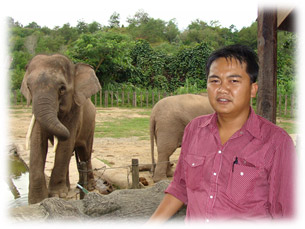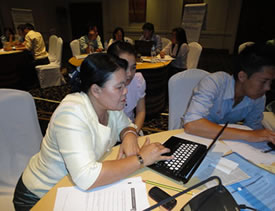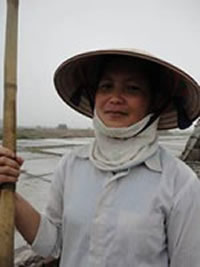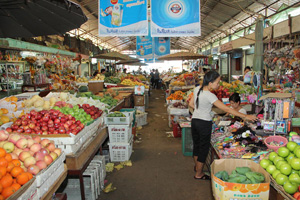
|

|
|
<< MID-BCC home page Blog Home ArchiveBy MonthJuly 2012 (2)June 2012 (1)May 2012 (3)April 2012 (5)March 2012 (1)By CountryCambodia (4)Lao PDR (4)Malaysia (1)Mozambique (1)Vietnam (2)By ProjectMID-BCC (9)PREVENT Project (3)
|
Blog: MID-BCC Field ObservationsMay 9, 2012-

First day all the workshop group from PREVENT is together in the same place – Fernando Garcia, David Zucker, Efua Orleans-Lindsay and Dee Bennett. We meet early to edit, re-order, rewrite, and translate presentation. This continued throughout the day and finalizedthe presentation’s materials, slides, and videos. More...
May 9, 2012-

My first trip to Sabah since vacationing there 15 years before, I found Sabah to be just as beautiful as I remembered it. But unlike my vacation visit in 1997, this time I planned to meet with the Sabah Wildlife Department in the hopes we might assist them in characterizing the human-wildlife interface and identify potentially risky behaviors that could allow transmission of zoonotic diseases from wildlife to people. More...
May 9, 2012-

Advocacy is a nuanced communication strategy and an important first step in creating behavior change among communities and organizations. Advocacy is well-developed and expertly executed in many countries and cultures, especially in the West. There are some cultures where it is not considered appropriate to advocate for a cause or an issue…and some governments look less kindly on non-governmental advocacy activities. More... April 24, 2012 -

The Mekong Delta Region is considered a hometown of rice field rats (Chuot Dong in Vietnamese). In the past, Chuot Dong meat was very cheap so there were few farmers who caught rats. But to-date, rat meat has become a special dish on the menu of many restaurants in the big cities of the Mekong. More...
April 23, 2012 -

Like the highly pathogenic avian influenza and H1N1, climate change faces the challenge of how science and technology could be made available to and utilized by vulnerable and at risk communities so that they can manage and cope with the impact of adverse events. I was nominated by my office to attend the Sixth International Conference on Community-based Adaptation in Hanoi, Vietnam. My part in this forum was to share the community-level communication approaches that were tested and found useful to help communities address pandemic threats and emergencies. More...
April 17, 2012 -

I traveled to Kampot, Svay Rieng, Kandal and Battambang the last week of March and first of April - just before New Years - to help organize and facilitate community forums on prevention related to bird flu (H5N1 virus). Because these communities have most recently had outbreaks of the virus or remained as gateways of poultry transportation from other countries, there was a lot of public interest. About 500 people joined the forum in each of the four border provinces, and local TV stations such as CTN, Bayon and TVK also covered the forums. More...

I find this project activity very interesting. All my life, the market has been a significant part of my role as a mother --- and now as a country manager of an infectious diseases project. I always go to the market to buy fresh fish, meat, vegetables, fruits and other commodities to suit my requirements in preparing food for my family, but I never realized that the market means more than a place where exchange of commodities and services takes place. More... Noi Xaymounvong, Training Specialist Consultant for MID-BCC, reports on the Vientiane Markets Hygiene Training conducted with the Ministry of Health and Center for Information and Education for Health - read her blog here March 20, 2012 -

Pre-departure training took place from March 10 to 11, but I could join only on the 11th. It started 7:30 and finished at about 11:30. The contents of the training are Buddhism, prayer, disciplines of the walk, how to teach students, general guidelines. But what is interesting is that there was a 30-minute training on how to teach hand washing to students and children at about 10:00. There was a revision of how to wash hands properly for all the monks. Since I got some A4 posters from FHI 360 here, I gave one to each of the 40 monks. More...
|
|
|
Copyright© 2011 FHI360 1825 Connecticut Avenue NW Washington, DC 20009 - 5721 
The Mekong Infectious Disease Behavior Change and Communication Project is funded by the United States Agency for International Development (USAID)/Global Health under Client Associate Award Number GHN-A-00-09-00002-00 under Leader Award (C-Change) No. GPO-A -00-07-00004-00 and managed by FHI 360. The information provided on this site is the responsibility of FHI 360 and is not official information from the U.S. Government and does not represent the views or positions of USAID or the U.S. Government. |
||